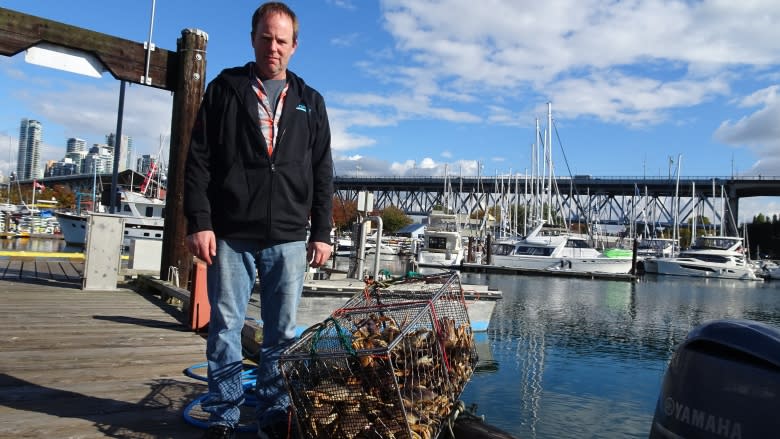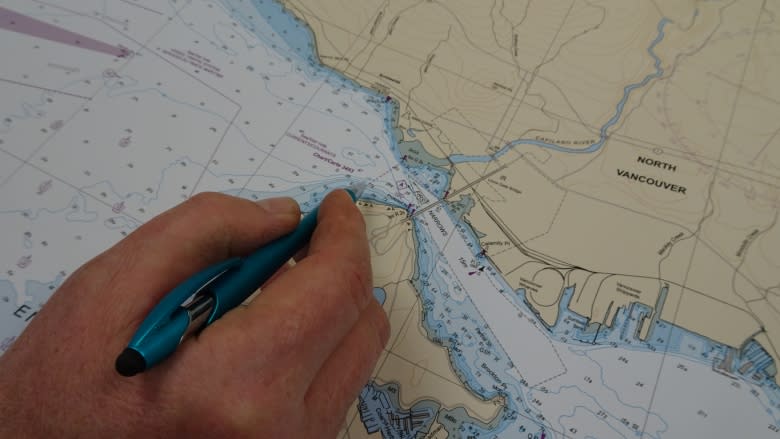B.C. crab and prawn fishermen dispute Port of Vancouver no-go zones
Crab fisherman Stewart McDonald is steaming mad that he may soon be prevented by the Port of Vancouver from dropping crab traps around Vancouver's Burrard Inlet, where he's fished for more than two decades.
"We fish there all the time," McDonald said from his home base in False Creek, where he has operated for the past 20 years.
McDonald says the fishing grounds, especially the water to the west of the Lions Gate Bridge are fertile crab and prawn areas, representing tens of thousands of dollars worth of harvest for him a year.
"People would be shocked by the amount of healthy sea life down there," he said.
Safety priority
On Friday, the Port of Vancouver, Canada's largest port, confirmed it has made changes to its information guide, which provides rules for where vessels — like McDonald's fishing boat — can travel.
A port spokesman said the changes were needed because the waters were getting crowded with recreational boaters.
"Over the past few years, we have seen an increase in the use of kayaks, paddleboards and other recreational activities in shipping lanes around the First and Second Narrows," said Chris Wellstood, the port's director of marine operations and security, in a release.
"At the same time, cruise ships and container ships are getting bigger, making it more challenging for them to maneuver through the First Narrows and Burrard Inlet."
The port maintains that its new guidelines don't reduce areas where commercial fishing boats can go. Rather, it says areas available to recreational paddlers and fishermen have actually increased to the west of Lions Gate Bridge and east of Second Narrows bridge.
'We're allowed to fish there'
McDonald disagrees, arguing the port's no-go zones west of Lions Gate Bridge and east of Second Narrows Bridge have never been legally off limits to fishing.
"We're allowed to fish there now," he said. "There isn't any problems, we're not causing anyone any problems. Why do we have to stop?"
In 2013, McDonald received a letter from Fisheries and Oceans Canada, requesting him to stop fishing after the Canadian Coast Guard complained.
Four years later, however, he continues to drop crab traps in the area. He said he has never been fined or threatened to have his licenses suspended.
A DFO paper on crab management in the Pacific region supports McDonald's claims that his boats and others have a right to fish there. The only closure it mentions is between the two bridges.
Port rules trump DFO rules
However, that may soon change as officials with DFO say the Port of Vancouver has authority to prohibit fishing in the navigable waters of the port.
The agency also plans to amend its fisheries management plans to align with fishery prohibitions mandated by the Port of Vancouver.
For years, McDonald and other fishermen have requested a map showing closures using GPS coordinates, much like the one it has for closures around Deltaport and Roberts Bank near the Tsawwassen ferry terminal.
He's yet to receive it, but is worried that it will eventually come.
"We believe that the port is going to use its legislative authority to ban us legally," said McDonald.
McDonald, along with prawn fishermen who belong to the Pacific Prawn Fishermen's Association, are also upset that the port did not directly contact them to discuss where they can fish as part of the amendments. They hope that will still happen.
In the meantime, the port says it will monitor its waterways — along with the coast guard and Vancouver police — and ask boaters it finds in unsafe areas to leave.




